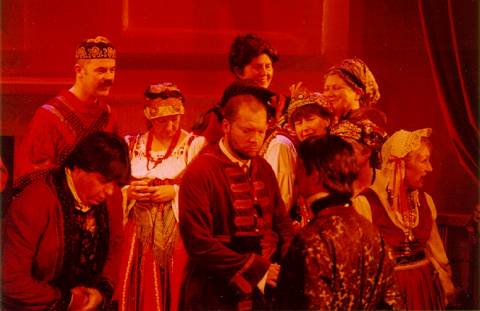|
<< -- 6 -- Roderic Dunnett THE HAUNTED MANOR


And then there is Skoluba (Mark Saberton), the 'keeper of the keys'.
A kind of head waiter-cum huntsman-cum-bailiff on this run down estate,
it is Skoluba who sets up the 'haunting' almost incidentally to take revenge
on the hapless Maciej. The scene launched with a hilarious double visual
coup (two huge cobwebs and a large rat crossing the stage, with spectacularly
creepy lighting from Bruce Williams), which set the scene for much hilarity
-- Skoluba and the shivering Maciej, his warrior's courage fled; the girls'
humorous, but significant, concealment 'within' two portraits (frighteningly
well staged); and Damazy ensconced in the clock and forever clucking interruptions;
all of which Moniuszko pieces together with the ease and freshness of a
Mozart. Saberton, a capable performer who has already proved a veritable
hit in another rarity, Bampton Classical Opera's The Comedy of Errors
(Storace), delivered some spinechilling 'Dobranocs' (So it's goodnight
-- 'So goodnight' might have been a better accentuation) and vividly
sang the well-translated aria about the clock that, like the run-down manor,
represents Poland : 'The clock you see is broken now' (the chimes, when
they sound, will be a call to arms).
The trombone and percussion that precede the timeless tape, flute and
keyboard of the musical clock sequence were aptly awesome. Both Stefan and
a cello had some initial tuning problems, yet each was redeemed in a fine
ensuing aria, 'Mother, dearest mother', with the cellos' echo of Miecznik's
patriotic musings leaving us no doubt as to its import. Bowyer's reprise
of Stefan's Act I drinking song was much better than in Act I; indeed, his
delivery alternated perilously between the exceptionally promising and the
dangerously bad. Damazy attempts his own bit of ghostly invention in a finely
accompanied aria : Molesworth's final triumphant fingersnap was another
hoot.
Hanna's aria, wrapped (rather less judiciously) in a national flag was
well served by the orchestra : pizzicato horn and strings, oboe and an admirable
violin solo; the Hanna-Stefan scene was strong. The male quartet, where
Miecznik emerges in his Swordbearer's finery (another Stevenson coup) sounded
wonderful, even if you couldn't actually hear a word; and the sleighbells
for Czesnikowa's return, bewitchingly atmospheric. Both the 'band' music
(another thing Moniuszko does well -- witness his other masterpiece, Halka)
and the blocking for the dance sequence were top-notch. In fact, one was
left feeling that Opera Omnibus had got right into the bones of this opera,
and revealed it as the masterpiece it is. No mean feat, and a matter for
congratulation.
Copyright © 26 April 2001
Roderic Dunnett, Zagreb, Croatia
 << Music
& Vision home
Mûza Rubackyté >>
<< Music
& Vision home
Mûza Rubackyté >>
|

